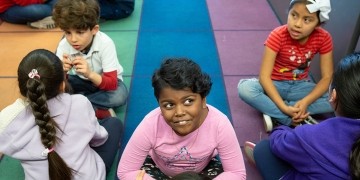A New Resource Provides Trauma-Informed Training for Educators

This post was originally published on August, 28, 2023 by EdSource.
“It takes a village.” When it comes to raising a child, we hear this phrase often. It takes extended families, neighbors and close friends to raise a child. It not only takes the support of society as a whole, but also the systems we’ve built. It’s an effort that starts at home but extends to the doctor or clinic’s office, to extracurricular activities and to school.
Anyone who regularly interacts with youth has the unique opportunity to help them feel seen, heard and supported. Our early care providers, educators and others who work in these environments, like coaches, librarians or receptionists, have many of these opportunities and are often the first line of support for today’s youth—especially those who have experienced trauma or adversity.
Research suggests that adverse childhood experiences—or ACEs—like homelessness, loss of parents or loved ones, abuse, neglect, violence or illness—can affect a student’s ability to learn as well as their behavior in the classroom. This can show up in a variety of ways, but research shows children with three or more ACEs are five times more likely to have attendance issues, six times more likely to have behavior problems, and three times more likely to experience academic failure.
But even one caring adult can make all the difference for a child who’s struggling.
That’s why it’s so important to continue to give our early care providers, educators and other school personnel tools and resources to help our young people manage stress and achieve the healthiest version of themselves. Safe Spaces: Foundations of Trauma-Informed Practice for Educational and Care Settings is a free, self-paced training designed to help educators, school personnel and child care providers understand and respond to trauma and stress in our youth. This resource, launched by the Office of the California Surgeon General, helps to reshape these critical interactions with youth who may be overwhelmed or need additional support by using effective strategies that can lead to healthier lives.
Safe Spaces is grounded in research and was developed in collaboration with experts in education and youth mental health. Through case examples, strategies, videos and practices, individuals gain the education and tools they need to be that pillar of support in a child’s life. Those who complete the training will also receive a certificate of completion from the Office of the California Surgeon General.
This training was made possible with funding from the California Children and Youth Behavioral Health Initiative. Safe Spaces is just one piece of a larger effort to reimagine the systems that support California’s children and youth.
In August 2022, Gov. Gavin Newsom announced California’s master plan for kids’ mental health, a multiyear effort to more holistically serve the state’s diverse children, youth and families. The California behavioral health initiative is at the very core of that plan. Additional investments include $4.1 billion to develop a community schools strategy that connects kids and families to essential health, mental health and social services alongside high-quality, supportive instruction with a strong focus on community, family and student engagement. To date, the State Board of Education has awarded grants to fund 1,028 schools to become community schools or expand their existing programs.
These investments in mental health and wraparound services for young people are designed to meet Californians where they are and make a tangible difference in their lives.
We continue to be inspired by the drive and passion of so many educators, early care providers and school personnel who are nurturing our youth. This training is just one example of how we can support them along the way.
Diana Ramos is California’s surgeon general and a public health leader dedicated to improving health care quality and equity.
Linda Darling-Hammond is the Charles E. Ducommun professor of education emeritus at Stanford University, president of the California State Board of Education and an adviser to Gov. Gavin Newsom.
Photo by Allison Shelley for EDUimages.
